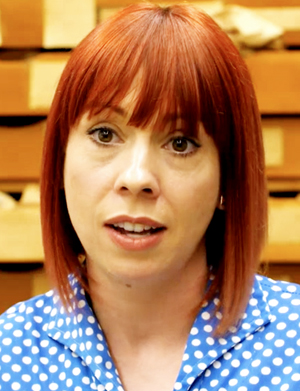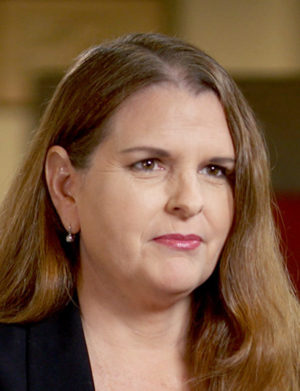Our faculty members participate in conferences around the world, conduct groundbreaking research, and publish books and journal papers that contribute to their field and highlight their expertise. We feature those accomplishments and more in this section.
College of Arts and Humanities
 Gilah Yelin Hirsch, professor of art, represented the United States in the First International Painters’ Symposium, “El Umbeligo de la Luna,” held in Mexico City, Mexico, May 20-June 3. During the symposium, Hirsch presented lectures on her interdisciplinary work, “Artist as Scientist in a Reflective Universe: A Process of Discovery.” She also discussed her role in the feminist art movement in the U.S. in the early 1970s, as well as created and exhibited a painting inspired by the ancient cultures that were highlighted during the symposium.
Gilah Yelin Hirsch, professor of art, represented the United States in the First International Painters’ Symposium, “El Umbeligo de la Luna,” held in Mexico City, Mexico, May 20-June 3. During the symposium, Hirsch presented lectures on her interdisciplinary work, “Artist as Scientist in a Reflective Universe: A Process of Discovery.” She also discussed her role in the feminist art movement in the U.S. in the early 1970s, as well as created and exhibited a painting inspired by the ancient cultures that were highlighted during the symposium.
College of Business Administration and Public Policy
 Hugo Ascencio, assistant professor of public administration, has authored the peer-reviewed article “The Effect of Ethical Leadership on Bribing and Favoritism: A Field Research Study,” which was published June 18 in the American Society for Public Administration’s scholarly journal Public Integrity. The piece underscores the need for ethical leadership and how it would reduce bribing and favoritism in government agencies. The article also indicates that empirical research on ethical leadership effectiveness in reducing corruption in such organizations remains underdeveloped.
Hugo Ascencio, assistant professor of public administration, has authored the peer-reviewed article “The Effect of Ethical Leadership on Bribing and Favoritism: A Field Research Study,” which was published June 18 in the American Society for Public Administration’s scholarly journal Public Integrity. The piece underscores the need for ethical leadership and how it would reduce bribing and favoritism in government agencies. The article also indicates that empirical research on ethical leadership effectiveness in reducing corruption in such organizations remains underdeveloped.
College of Natural and Behavioral Sciences
 Larry Rosen, emeritus professor of psychology, posted the editorial “Will Apple and Google’s New Apps Change Addictive Phone Use?” June 13 on his Psychology Today blog “Rewired: The Psychology of Technology.” Rosen’s piece addresses the announcement of phone apps for the iPhone (Screen Time) and Android devices (Digital Wellbeing) that are designed to discourage smartphone overuse by citing data compiled by Rosen and his colleagues on smart phone addiction.
Larry Rosen, emeritus professor of psychology, posted the editorial “Will Apple and Google’s New Apps Change Addictive Phone Use?” June 13 on his Psychology Today blog “Rewired: The Psychology of Technology.” Rosen’s piece addresses the announcement of phone apps for the iPhone (Screen Time) and Android devices (Digital Wellbeing) that are designed to discourage smartphone overuse by citing data compiled by Rosen and his colleagues on smart phone addiction.
Recent quotes and/or interviews in the media from faculty
 “The few that are available for medical study become pretty expensive and that’s why we end up purchasing plastic replica skulls; because they’re just easier to get a hold of and they hold up better because real human skulls are quite fragile.” – Sarah Lacy, assistant professor of anthropology, was interviewed for the NBC-4 feature “Are Museum Bones on Display Real or Replica?
“The few that are available for medical study become pretty expensive and that’s why we end up purchasing plastic replica skulls; because they’re just easier to get a hold of and they hold up better because real human skulls are quite fragile.” – Sarah Lacy, assistant professor of anthropology, was interviewed for the NBC-4 feature “Are Museum Bones on Display Real or Replica?
 “The more people use their phones the more anxious they are about using their phones. …If you’re constantly connected you’re going to feel anxiety and the more people feel anxiety the more it can lead to other things like mental health and physical ailments.” – Nancy Cheever, chair and professor of the Department of Communications, was quoted in the CBN News article “Health Experts Agree with Simon Cowell? For a Happier Life, Turn Off Your Phone” from an ABC News interview she did in July 2017.
“The more people use their phones the more anxious they are about using their phones. …If you’re constantly connected you’re going to feel anxiety and the more people feel anxiety the more it can lead to other things like mental health and physical ailments.” – Nancy Cheever, chair and professor of the Department of Communications, was quoted in the CBN News article “Health Experts Agree with Simon Cowell? For a Happier Life, Turn Off Your Phone” from an ABC News interview she did in July 2017.
“We assume teenagers are using their phones more but it’s actually not the case because younger people tend to have a lot more awareness of their smartphone use. They have a more complete understanding of the harmful effects of smartphone use because they’ve been taught about it since they were kids.” – Nancy Cheever, chair and professor of the Department of Communications, was quoted in the New York Times article “Me and My Numb Thumb: A Tale of Tech, Texts and Tendons” on May 19.